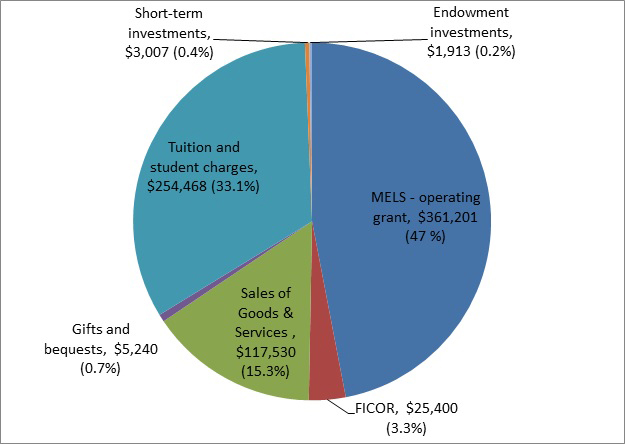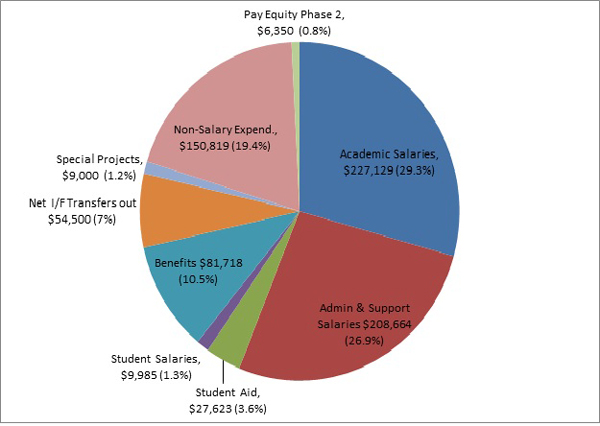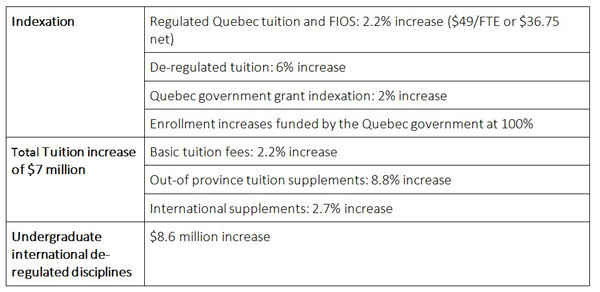
By McGill Reporter Staff
In light of continued funding uncertainty, McGill must preserve what it has achieved over the last year, Provost Anthony C. Masi told Senate on April 23. His presentation was the last of three updates on McGill’s budget planning in the run-up to the Board of Governors’ April 29 final approval of the budget for fiscal 2014-2015 (FY2015).
Last year got results
Masi’s presentation focused on McGill’s operating budget. He said the University is on track to closing FY2014 with an operating deficit of approximately $10.4 million, as projected in April 2013. This is in large part due to the effects of last year’s cost-reduction measures. Departures from the Voluntary Retirement Program (VRP), a permanent reduction of operating budgets across the University, last year’s forgone salary increases and a series of local measures undertaken by Faculties and Administrative units have resulted in expense reductions of more than $40 million thus far.
When asked how the University plans to maintain those savings, Masi responded that the focus will remain on maintaining the FY2014 reductions in the number of administrative and support staff, especially in central units. Principal Suzanne Fortier added that one of McGill’s main priorities will be to become more agile as an organization. “We want to look carefully at how we work,” she said. “We want to look at our processes and evaluate if some of them can be cumbersome, we want to put our resources in the right places and into the right processes.”
Anticipated FY2015 revenues
“Preparing a budget is always tricky,” Masi said. “It represents our best guess on a series of assumptions we must make both in terms of our revenues as well as our expenses.” Based on the best information now available, McGill is anticipating $768.8 million in operating revenue for FY2015.

The Provost however indicated that uncertainty with regard to McGill’s revenues in FY2015 continues on many fronts. McGill has not yet received an official confirmation of FY2015 government reinvestment; no university was able to sign its individual reinvestment agreement prior to the April 7 provincial election. McGill’s best guess is that the University will receive the $27 million reinvestment promised when the election was called. If this amount does not come through or is considerably smaller, it will have a significant impact on McGill’s revenue.
The other FY2015 operating revenue assumptions include:
The assumptions used to build Budget FY2015 are however undermined by a series of unknowns:
• Will economic conditions modify the funding commitments made by the Marois government?
• Will government funding change significantly as a result of recommendations stemming from the “Chantier sur le financement”?
• Will enrolment growth targets be realized, particularly among de-regulated international students?
• Will tuition policy related to international students change (e.g., through further deregulation)?
• What will be the best strategy to tackle McGill’s deferred maintenance and IT backlogs?
Significant undertakings
Masi was clear, however, that regardless of the actual levels of reinvestment, Budget FY2015 will allow McGill to meet all its current commitments, including:
• Continuing to enhance student aid, for a total of $28 million.
• Increasing academic and administrative and support staff salaries, at a cost of more than $17 million. This includes an ambitious academic salary policy that will raise the competitiveness of McGill’s academic salaries among the U15.
• Completing pay equity adjustments, which totalled $21 million in FY14 and further adjustments are planned for FY15. Thereafter, the ongoing cost of pay-equity is expected to reach $1.7 million per year.
• Providing an additional $15 million fund the pension plan deficit.
• Generating funds to repay the $24-million deficit McGill will have accumulated in FY13 and FY14 following the government cuts. The conditions of this repayment remain unclear.
• Investing in IT improvements.
Budget FY2015 is also built to undertake challenges that McGill will continue to address in coming years, including:
• Maintaining the savings reached through the FY2014 cost-reduction measures.
• Focusing on finding ways to diversify revenues, both operating and capital.
When asked how the University plans to accomplish the latter, Masi indicated that McGill is open to exploring a few avenues, including full de-regulation of international students and self-financed programs. When asked about plans to grow enrolment, McGill’s biggest source of revenue, the Provost responded that McGill continues to have capacity for growth in professional programs and in graduate studies, for instance through the design of new Master’s programs. But he indicated that any such growth is contingent on space availability and resources needed to adequately support graduate students.
The opportunities
The Provost pointed out that while McGill must remain realistic and vigilant with regard to its resources, if the University stays the course as outlined in Budget FY2015, and projected revenues hold, it will be able to fund its main priorities and meet its existing commitments in the new fiscal year and beyond. By following the plan, by FY2016 McGill will also be on track to repaying its accumulated deficit — one of the surest ways to gain financial stability and prevent interest rates on debt repayment from weighing on the operating budget.
Masi underscored that the strategic priority areas that will receive special consideration in FY2015 are in line with McGill’s planning, outlined in ASAP 2012 and in Prof. Fortier’s vision as outlined in her address to the University on March 28. They touch the following three areas:
• Advancing McGill’s excellence in teaching, research and knowledge dissemination and exchange, including retaining and recruiting top academic talent.
• Continuing to enhance student life and learning experiences, inside and outside the classroom.
• Continuing to strengthen McGill’s role, reputation and success as a partner locally and globally.
Budget FY2015 projects total operating expenditures to reach $775.7 million and Masi anticipates closing FY2015 with a $7-million annual deficit.

More details and further numbers are available in the Provost’s full presentation.

